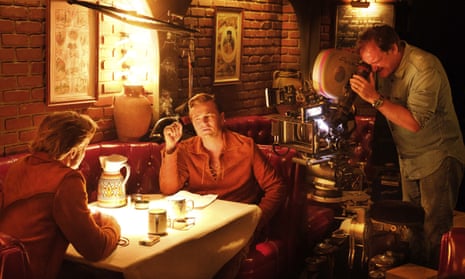How on earth are the movies going to compete with all that deliciously seductive #content on streaming services? How do you persuade people to mask up and venture out to the cinema when they can sprawl on the sofa and watch Succession’s gorgeously horrible Roy family for less money and hassle. People will leave their homes for James Bond and Spider-Man. But the grownup movies – the cinema of ideas and character and dialogue and complexity – well, people are increasingly tempted to stay home for those.
James Cameron, director of mighty box-office champs such as Titanic and Avatar has the answer: six-hour films! Films with the amplitude and the addiction factor of long-form TV. At first glance, that sounds like a buttock-annihilating nightmare, and a six-hour film from the alpha-gorilla Cameron is another worry. Six hours of Cameron’s cheerfully macho storytelling? Six hours of military hardware, and people in flightsuits walking into vast hangars with fighter-planes? Or does Mr Cameron have a six-hour cut of Titanic up his sleeve?
Actually, that’s not really what he’s suggesting. What Cameron has in mind is a new integrated theatrical-streaming distribution model in which a six-hour “movie” is shown in a number of episodes for home viewing and then in a shorter, slimmed-down two-hour version for movie theatres. It’s not out of the question – and it’s been done before. Olivier Assayas’s 2010 work Carlos, starring Édgar Ramírez as Carlos the Jackal was shown in three TV episodes totalling five-and-a-half hours but in cinemas shorter versions were shown. And for literary adaptations, it could make sense. After all, Granada Television’s legendary 11-episode version of Brideshead Revisited in 1981 weighed in at almost 12 hours: a different, perfectly plausible 2008 feature film version of the same novel came in at two hours 14 minutes. You could fuse the two concepts … couldn’t you?
Film has traditionally responded to the threat from television by emphasising grandeur and scale. In the decades after the war, and worried about TV, Hollywood gave us epic movies, biblical and sword-and-sandal dramas, often shown in awe-inspiring widescreen mode. The threat to cinema is different here – now it’s almost as if television is the bigger form with an almost unlimited running time for its products. So maybe the Cameron model is workable.
The danger is of course that the cinema will just come off looking like second best. Who wants to see the short-change cut version of some sexy new drama in cinemas – which will inevitably also be subtly longer than the comfortable feature-film length – when you can get the real thing at home in full measure, and submit to the deferred, extended pleasure of episodic narrative, which is the whole point of TV entertainment? And of course, it would be the sex and violence that would get chopped for cinemas and bowdlerisation would rule.
Of course, cinema is already giving us “serial” movies. Denis Villeneuve’s colossal new sci-fi Dune is only part one – part two is due to follow. And in the arthouse realm, Joanna Hogg’s autobiographical film The Souvenir came out in two parts. But this isn’t quite the same thing. And time is different watching TV – bingeing something for four hours is different from watching a four-hour movie: with the TV show you can bail out at any stage without inconvenience or feeling culturally shallow or disloyal. Not so in the cinema.
Well, it would be interesting if Netflix or Amazon Prime tried the Cameron model. But what I’d really like – masochistically enough – is a six-hour movie culture that had the courage of its convictions: showing the actual six-hour films in cinemas. A new Bollywood-style sense of scale, to toughen up pampered western movie consumers. Cinephiles dream of finding the original eight-hour cut of the Erich von Stroheim 1924 silent drama Greed. I would love to see the rumoured 20-hour cut of Quentin Tarantino’s Once Upon a Time in Hollywood. At all events, I want to maintain the concept of committing to an entire created artwork, in its entirety, all at once, from beginning to end – and the cinema is still the best place for that.
Peter Bradshaw is the Guardian’s film critic

